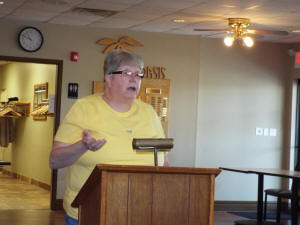 After discussing scams involving telemarketers, and con artists who
will impersonate government officials and even family members in
order to get money, Landers moved on to internet scams. Sixty
percent of the population over the age of 60 uses the internet and
of those 70-plus percent are on the internet daily. After discussing scams involving telemarketers, and con artists who
will impersonate government officials and even family members in
order to get money, Landers moved on to internet scams. Sixty
percent of the population over the age of 60 uses the internet and
of those 70-plus percent are on the internet daily.
Landers said that posting on social media has created a “firestorm
of crimes,” and he cautioned the audience to be cautious of what
they do post. He also noted that these are great ways to stay
connected with family and friends, but everyone should be aware
there are criminals looking for information via social media.
He spoke about viruses, Trojan Horses and malware that come to
victims via emails. Again, the emails could be from familiar people,
and the receiver may trust the sender and click on links in the
email. Then later they will find out the real sender was a scammer
who had hacked the friend or family member's account, and now have
hacked the receivers account as well.
State’s Attorney Wright added to this discussion telling guests to
examine the subject lines, and if it doesn’t seem like something a
friend or family member would typically send, then delete it.

An audience member shared, and Landers confirmed it that when
hackers have control of the computer, they not only have vital
information about the owner, but they also have control over the
computer. This was mentioned specifically in regard to webcams. When
a computer is turned on, even if the camera is off, a hacker can
turn that camera on and view whatever the camera is seeing at the
time. Landers said to be truly secure, one should cover the camera
lens when it is not in use.
Another topic was the quality of prescription drugs found on the
internet. Landers warned that not every site that sells
prescriptions is above board. He said there are sites where that
when you order your medication, what you receive will not be the
actual drug ordered. This is obviously dangerous to the health of
the buyer, plus it is taking money out of the buyer’s pocket.
In another scam, a telephone caller will say there is a problem with
your Microsoft Windows program. If you allow them remote access to
your computer, they will fix the problem. This will never happen.
Microsoft is a mega-giant company, and they will not use personal
phone calls to address problems with their software. Landers told
the audience that this was one way thieves can gain control of their
computers and in a moment collect from it all the personal
information you may have stored there.
Landers next approached the subject of mail fraud. He began with the
typical sweepstakes scam.
A letter arrives in the mail, you’ve won a significant amount of
money, but in order to collect the money, you need to pay a fee back
to the sender. He told the audience, “No lottery in the world will
ever ask you to send money.”
A variation of this scam is that the envelope will contain a money
order already made out to you, but you need to return a percentage
of it as a fee. The letter will instruct the receiver to take the
money order to the bank, but to get a certain amount of cash and
send it back via Western Union. Landers said the scam works. The
bank will take the money order and give you the cash to return to
the sender. But, a few days later, you’ll be contacted from the bank
that the money order was bogus, and you have to return the money.
A member of the audience asked if the bank can be held responsible
because they accepted the money order. Landers said they cannot.
At this time of year, home repair scams are a popular means for
criminals to take advantage of homeowners. In most cases, Landers
said, these will be door-to-door salesmen. A prime example, the
criminal will knock on the door and say he is resurfacing a driveway
down the street and has some left over asphalt. He will do your
driveway with the left over if you wish.

Landers said there are a few approaches to this scam. First, they
may do the work you ask them to do, but then they will start
“seeing” other things around your property that needs to be done.
They will continue to seek out work and money, but they are not
performing the work as promised.
He said it was not unusual for these scammers to paint a driveway
with black paint and call it asphalt. The result is not only did you
not get what you paid for, but the paint has an adverse affect on
your driveway. Another home repair switch is the scammer will offer
to seal up some loose shingles on the roof with roof sealant. Then,
they go on the roof and paint the shingles with metallic silver
paint that has no sealant properties. Again, the criminal not only
has your money, but he has ruined your roof shingles.
Landers also warned of the distracting salesman scam. He said it
happens with two people who make their way into the home. While one
person is distracting the homeowner with conversation and a sales
pitch of some sort, the other is casing the house, looking for
valuables, maybe stealing small items such as jewelry along the way.
Landers said the best defense here, is to not allow anyone inside
your home that you do not know and trust.
Landers said if you need work done around the house and don’t know
who to call, the best idea is to ask friends and relatives for
suggestions or recommendations.
[to top of second
column] |


The next person to address the audience at the Oasis was Nancy
Kauffold of Senior Services of Central Illinois. Kauffold works with
the Criminal Victim and Witness Assistance Program inside Senior
Services. She said that one of her principal duties was to assist
victims in filing victim claim forms with the authorities. She
spoke ambiguously about cases she has been involved with where
elderly women were threatened with bodily injury or rape, and even
cases where women were physically assaulted.
A question came from the audience, is there anyone who can help a
homeowner find out if a repair person is legitimate or a business
properly licensed? Kauffold said that she could help with that as
well. Anyone who wants to check out a business or handyman service
can call her office, and she will be able to assist in checking
someone out. During the course of the meeting, there was a great
deal of audience participation. As the meeting went beyond the
allotted amount of time, Logan County States Attorney Jonathan
Wright was the final speaker.

He kept his comments brief and focused on one topic, the need to
report all fraud to the appropriate law enforcement. He said that
for seniors especially, it can be a difficult task. It is
embarrassing to admit that you were taken advantage of, but doing so
is very important.

The Illinois Attorney General Lisa Madigan plays hard-ball with all
types of scammers. She aggressively prosecutes those who are caught
through the work of her office and the state.
Madigan’s official website also contains numerous links to
information to help avoid being scammed. The Attorney General
submits press releases on a regular basis to Lincoln Daily News
regarding many issues that can have an affect on Logan County
residents.

As the meeting drew to a close, Kauffold, who was accompanied by
Amanda Briick, offered the group several handouts including a tip
sheet on how to avoid being scammed, as well as business cards with
contact information for her office. Landers handed out fact sheets
on known criminals James Costello, and Lynette and Billy Collins.
Kauffold’s office is located at 701 West Mason in Springfield. The
phone number is 217-528-4035, ext. 141. The Senior Services website
is www.ssoci.org
Landers is available at the Logan County Sherriff’s Office. That
phone number is 217-732-4159

State’s Attorney Wright has offices in the Logan County Courthouse.
The phone number for that office 217-732-2184.
[Nila Smith]
Past related article
Guests at Oasis
learn about scams
Part one: Common and costly telephone scams |